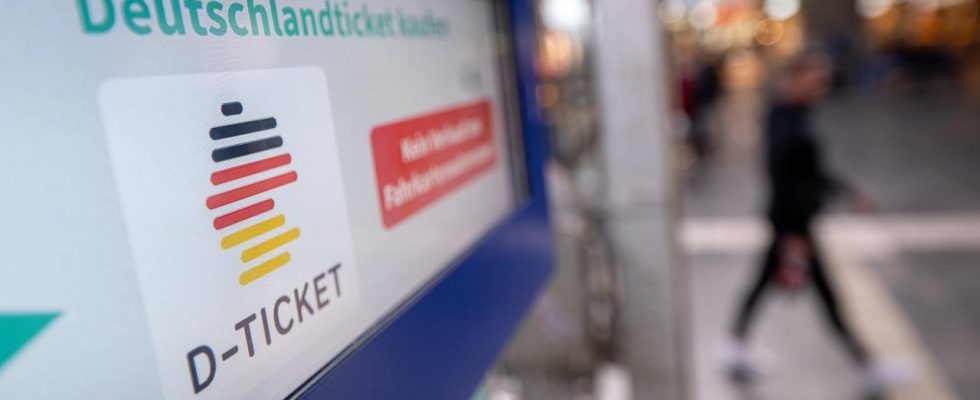People often talk about the traffic light project as their most popular project, but the Deutschlandticket has also caused a lot of trouble in its one-year history – especially between the federal and state governments.
If the Federal Minister of Transport has a topic that he likes to talk about, it is the Deutschlandticket. After all, Volker Wissing (FDP) also invented it. The simple idea behind it is a digital ticket, a uniform price of 49 euros, valid in cities and regional transport throughout Germany. The Deutschlandticket is intended to help make the jungle of tariffs at least a little clearer. Wissing says in an interview with the first birthday ARD capital studiothe “most modern public transport ticket in all of Europe” is now indispensable.
The numbers seem to confirm this. The Deutschlandticket has eleven million subscribers, and one in eight Germans uses it. Around one in four people tried out the Deutschlandticket at least once in the first year. The chairman of the Conference of Transport Ministers, Oliver Krischer (Greens), even sees this as “a medium-sized revolution in local transport.”
And Knut Ringat, Vice President of the Association of German Transport Companies (VDV), also joins in the praise, after all, Germany has “passenger numbers that were before Corona. And that despite working from home.”
Hardly any new customers on public transport
Many transport companies transport more passengers than in previous years, but revenues have not increased accordingly. Most customers pay less with the Deutschlandticket, but it has not yet convinced many new customers. Only eight percent of Deutschlandticket users had not previously traveled regularly by bus or train.
This is neither enough to be able to offer the ticket economically in the long term nor to achieve the climate goals. “I need at least 20 percent more new customers to be economically successful,” calculates Ringat from VDV. In order to achieve the climate goals, 30 percent of new customers are necessary.
The transport companies therefore want to sell more Germany tickets, especially as job tickets. “We want to and will and must increase this proportion.” Experts believe that up to 15 million job tickets alone could be sold. This is also because the price for customers drops to less than 35 euros – because subsidies from the state and employers are added.
Long-term financing unclear
So far, some companies have hesitated to offer these job tickets because it is not clear whether the Germany ticket will be available permanently. Because the debate about its financing is as old as the Deutschlandticket, half of which is shouldered by the federal government and half by the states. In January, both sides agreed to continue the offer for 49 euros a month – for the time being.
Transport Minister Wissing is convinced that the Deutschlandticket will remain. “We have to tell companies clearly: I could introduce the job ticket in the form of the Germany ticket,” says Wissing. Nobody questions that anymore. The SPD’s transport policy spokeswoman, Isabel Cademartori, warns, however, that “the discussion about the price and the future of the Deutschlandticket” would jeopardize its acceptance and calls for “long-term and stable financing structures” from the federal and state governments.
Ingo Wortmann, President of the Association of Transport Companies, is calling for more money from the federal government. There isn’t even enough money to maintain the current offering, especially not to expand local transport. “We urgently want to avoid having a great new ticket but at the same time having fewer buses and trains.” But that is currently a threat, warns Wortmann.
Berlin is taking its own path with the 29 euro ticket
Transport Minister Wissing considers the fact that the Berlin 29-euro ticket, with which the capital will go its own way from July 1st, to be counterproductive in the middle of the debate about long-term financing. Wissing sees a “credibility problem” if the Berlin Senate demands more money for the Germany ticket, but at the same time brings an even cheaper regional ticket onto the market.
Every second Germany ticket is now digital. However, there is still no central digital sales platform. Transport companies could save millions, for example by joining forces and selling tickets via a common digital platform. Federal Transport Minister Wissing is also demanding changes from companies. It can’t be right to just leave everything as it always was. “We have more than 60 transport associations. We don’t really need them. You can use efficiency reserves here. This also helps to free up funds for expansion.”
The Germany ticket as Digitization project
Money that could also help keep the price of the ticket stable. Nobody wanted to predict exactly how long it would remain at 49 euros on the first birthday.
Wissing prefers to rely on other predictions. For him, the Deutschlandticket was a digitization project from the start. He wants the states and transport companies to collect digital data in the future in order to be able to better plan and control public transport. A lot still has to happen in the background for this to happen. “The faster they make progress, the more likely it is that the second birthday of the Deutschland Ticket will be celebrated just like the first,” believes the Federal Transport Minister.


